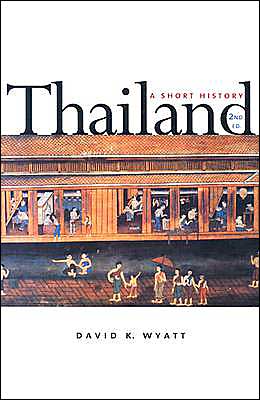

 |

|

The average rating for Thailand A Short History based on 2 reviews is 4 stars.
Review # 1 was written on 2013-12-28 00:00:00 Stephen Love Stephen LoveWhile a number of reviews said this was a 'dry' book or a 'difficult' read, I think that those people were perhaps forgetting that this is a history book, and therefore would not be as exciting as the latest episode of Dr. Who. I enjoyed it, and learning about the migrations of people from place to place, how the populace spread and why, that's important even in a Short History of a land. Other reviewers also complained about Wyatt's focus on the actions of the rulers of the land but a) The author explains why he focuses on kings in the introduction and b) A king's policies and decisions effect the entire country, land and people, and that's basic information one needs if one is to learn anything further about the history of Thailand. Again, I enjoyed the stories, didn't think them dry at all; the history of the Suffering Prince (p. 31), the kingdom of Lan Na (p. 44-50), and Rama the Bold (p. 53-59) were particularly interesting. Rama's policy of sharing the throne once a week with monks (p. 55) and his desire to be a moral ruler as well as a civil authority was intriguing. As early as pg. 7 Wyatt was emphasizing how kingdoms grew and chiefs helped the early Tai people band together for survival, how the situation was one of mutual protection. This is an important point to be made, especially if your audience is modern Americans who are generally biased in favor of independence. Being more familiar with Western history I appreciated seeing the many similarities in how countries began and grew, how 'princesses' were married off to strengthen the kingdom (p. 17) and to solidify relations with other countries (p. 52). I also thought it was interesting when Wyatt made the point that (due to underpopulation) daughters inherited equally (p. 4) as opposed to the situation in India and China (and the West). Using language to date and identify how countries arose and developed, and the discussions thereof (p. 2, 17, 64...) were enlightening. Being more familiar with Western history I found Ayudhya's law fascinating; if it was in use by 1397 that means that the need for formal legislation of that kind was necessary in the growing civilizations of both East and West (I'm thinking of the Magna Carta of 1215) around the same developmental period (possibly the difference of a century has to do with how people pressed in together argue more and require formal laws sooner!). I also saw a commonality between Russia's Rasputin and the sorcerer-monk of King Trailok, though the connection was more one of how people will use any means necessary to achieve their ends, and less one of chronology. Finally, I loved learning that C. Columbus wasn't the only one to mis-name a people, that the the Sukhothai were in all likelihood the 'Siamese' whose sewing and silk were so sought after in the 1290s (long before a formal Siam existed), that King Anorahta mistakenly believed the Tai he conquered and absorbed into his empire were 'Chinese' (p. 34), and I loved seeing the words 'paramountcy' (p. 68), and elephantry (p. 76) in print! Worth an ILL! |
Review # 2 was written on 2019-07-23 00:00:00 Stephen Willies Stephen WilliesSurprisingly, I have vaguely been familiar with Prof. David K. Wyatt since my college years, that is, more than four decades ago as an eminent American scholar with his published articles, translated early Thai texts and some books on Thai history. This one has been highly-acclaimed and cited as an authoritative reference. It is a pity I have never read him before; however, I have changed my mind since the last week of June by reflecting that I should read him for comparison after reading ประวัติศาสตร์ไทยร่วมสมัย (Prawattisat thai ruamsamai) the translated Thai version of A History of Thailand, Third Edition (Cambridge University Press, 2014) by Chris Baker and Pasuk Phongpaichit. Furthermore, justifiably speaking, I think I should read the English version as well. To continue . . . |
CAN'T FIND WHAT YOU'RE LOOKING FOR? CLICK HERE!!!